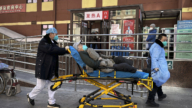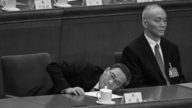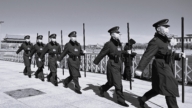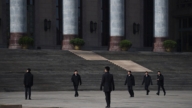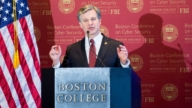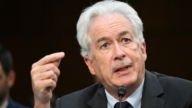【新唐人2014年02月19日讯】台湾“国民党”荣誉主席连战17号到20号在北京访问。而前不久两岸高官刚刚会晤。面对紧锣密鼓的磋商,台湾朝野认为解决两岸问题的关键是什么?台湾的经济发展是否需要依赖大陆?请听他们的心声。
据大陆媒体报导,台湾“国民党”荣誉主席连战率政商代表团17号到达北京,18号下午会晤中共国家主席习近平。这是他从2005年开始第14次访问大陆。
而13号,台湾“陆委会”主委王郁琦在上海,刚刚和大陆“国台办”主任张志军第二次会谈,双方曾触及马英九和习近平见面的话题,引起海峡两岸的高度关注。
台湾“民进党”中执委、时政评论家洪智坤认为,连战访问北京,实质上是“王张会”的第二阶段工作。
台湾民进党中执委洪智坤:“国、共在从经济的协商进入到一个政治协商的阶段,这样的一个秘密协商的方式是会受到台湾人民质疑。老一代政治人物没有权力去替两岸人民决定未来的政治前途。对两岸的人民是不公平的。”
大陆媒体在报导连战来访时,重点报导了他说的“这些问题,我们这一辈能够解决,那最好,不要遗留下一代解决。”那么,台湾人如何看待解决两岸问题的关键呢?
洪智坤:“我们希望未来两岸能够在自由、民主、人权的基础之下,进行两岸未来政治终局的一个谈判。如果没有办法改善大陆的人权迫害,如果律师替法轮功来辩护都要遭受牢狱之灾的话,那么这样的一个极权,是台湾人民所无法接受。”
1949年中共在中国大陆建立一党专政,“中华民国”在台湾逐步建成民主体制。两岸经历了30多年的互相封闭和军事敌对,近30年左右才允许探亲、通商和旅游等。
两岸同根、同源、同种族、同文化,是因为政治制度的不同,造成两岸问题60多年不能解决。
台湾人权律师邱晃泉认为,台湾在民主体制下,不相信中共足以代表全体中国人来解决两岸问题。因为普世的价值观才是解决问题的关键。
台湾人权律师邱晃泉:“我认为民主跟人权应该是关键。台湾未来要怎么走,必须注意全台湾人的想法,透过民主的机制,来决定它的方向跟步骤。那未来两边要如何建立什么关系?也应该是要尊重中国人民的意愿的。而不是中共少数人在做决定的。”
近年来,大陆曾提供所谓政策优惠,吸引台湾商界赴大陆开工厂、通贸易等。在短暂的“两岸蜜月期”后,大量台商在大陆以外曝光中共体制内官商勾结,巧取豪夺,侵吞台商资产,造成许多台商倾家荡产,甚至客死异乡等消息。
台湾民间大量讨论:是否需要在经济上过度依赖大陆,并且因此在政治上接受中共统战,而失去民主、自由等立国之本呢?
洪智坤:“台湾是一个自由贸易港,不是只有跟大陆做生意。目前两岸的产业发展,已经从分工链的关系转变为竞争的关系。在全球各国的工厂都要从中国市场撤退的时候,台湾应该朝向更多元的国际化的市场,这样对台湾才有安全上的保障。”
邱晃泉认为,即便两岸通商能使人受益,那也是少数企业家和财团受益,但是商人的利益不应该高过其他人的,更不应该高过普世价值。
邱晃泉:“经济有它的发展法则,绝对不是哪一方要特别依赖另外一方。有它的法则,这个法则才是决定长久的发展,而不是靠着你给什么好处,那这一点都不健康。特别是更不应该以牺牲了台湾的自由、民主、人权,去换取那些利益。”
中共在历史上长期恐吓台湾“不排除使用武力”,同时又对台湾各阶层人士,如黄埔军校的老人、或政界、商界和媒体界等系统的统战,外界评价这是“一手硬一手软,两手都要抓”策略。
采访编辑/唐音 后制/萧宇
Lien Chan Visits Beijing—Cross-Strait Issues Raise Concerns
Lien Chan, Taiwan Kuomintang (KMT) Honorary Chairman
is visiting Beijing from Feb. 17 to Feb. 20.
With an official meeting having recently been held between
Taiwan and China, cross-Strait contacts have been frequent.
What is the key to solving issues across the Taiwan Strait?
Should Taiwan rely on China for economic development?
What’s the opinion of the Taiwanese people?
The following is our report.
Taiwan’s KMT Honorary Chairman Lien Chan arrived
in Beijing on Feb. 17.
The delegation of official and business representatives from
Taiwan met Xi Jinping on the afternoon of Feb. 18.
This is Lien Chan’s fourteenth visit to China since 2005.
Prior to this, Taiwan’s Mainland Affairs Council Minister
Wang Yu-chi had visited Shanghai on Feb. 13.
It was his second meeting with Zhang Zhijun, Director
of the Taiwan Affairs Office of China’s State Council.
The purpose was to discuss a potential meeting between
Ma Ying-jeou and Xi Jinping, which has caused
great concern across the Taiwan Strait.
Taiwan Democratic Progressive Party (DPP)
executive committee Hong Chih-kun believes
Lien Chan’s visit to Beijing is in essence the second stage
of meetings following the meeting of Wang and Zhang.
Hong Chih-kun, DPP Executive Committee: “Negotiations
have taken place between Taiwan and China
on economic and political issues.
Such a secret meeting is questionable to Taiwan.
The older generation of politicians have no right to decide
the political future of people across the Strait.
It is not fair to either side."
China’s media reported Lien Chan believes it will be best
to solve cross-Strait issues during his tenure as opposed
to leaving them to the next generation.
Exactly how does Taiwan view the cross-Strait issues?
Hong Chih-kun: “We hope to conduct political negotiations
on the basis of freedom, democracy, and human rights.
People in Taiwan will not accept totalitarianism that
continues to abuse human rights and even imprisons
lawyers for defending Falun Gong."
The Chinese Communist Party (CCP) established
the dictatorship regime in China in 1949,
whereas the Republic of China
gradually built democracy in Taiwan.
Mutual cross-Strait closures and military hostilities
have lasted for more than 30 years.
Only recently have visit, trade and tourism
been allowed.
While both sides share the same roots, origin, race
and culture, the 60 years of cross-Strait issues is due
to the vastly different political systems.
Taiwan human rights lawyer Chiu Huang-chuan believes
democratic Taiwan will not trust the CCP to serve
as representative of all Chinese regarding cross-Strait issues.
Universal values are key.
Chiu Huang-chuan, Taiwan human rights lawyer: “I believe
the keys are democracy and human rights.
The future of Taiwan is in the hands of every Taiwanese
person via the mechanism of democracy.
As for the future cross-Strait relationship, the wishes
of the Chinese people ought be to respected as well,
rather than just a few people in the CCP."
China offered policy concessions to attract Taiwanese
businessmen to build factories and run trade in China.
However, after a brief honeymoon period, Taiwanese
businessmen have been exposed to collusion, extortion,
embezzelment of the CCP regime, which has led to
bankruptcy or even death for many Taiwanese businessmen.
The Taiwanese people question whether it is really necessary
to rely on China for economy and accept the CCP united front
politically at the cost of democracy and freedom.
Hong Chih-kun: “Taiwan is a free trade port, conducting
business with more than just China.
The industrial development on both sides has transformed
from a relationship of division to one of fierce competition.
When factories retreat from China, Taiwan should diversify
towards a multi-national market for higher security."
Chiu Huang-chuan believes cross-Strait trading is beneficial
only to a small number of entrepreneurs and corporations.
However, the interests of businesses should not outweigh
the benefits to the public or overshadow universal values.
Chiu Huang-chuan: “Economic development has its own
rules, and reliance on one particular entity is not one of them.
The rules, not the benefits, decide the length
and the health of development.
Taiwan’s freedom, democracy, and human rights
cannot be exchanged with the benefits."
The CCP has long been intimidating Taiwan with
the use of force.
In the mean time, the CCP has also conducted its united front
tactics on all walks of life in Taiwan, such as the veteran
Whampoa Military Academy, and political, business
and media circles.
The CCP pulls out all the stops for any chance
to control Taiwan.
Interview & Edit/TangYin Post-Production/XiaoYu



